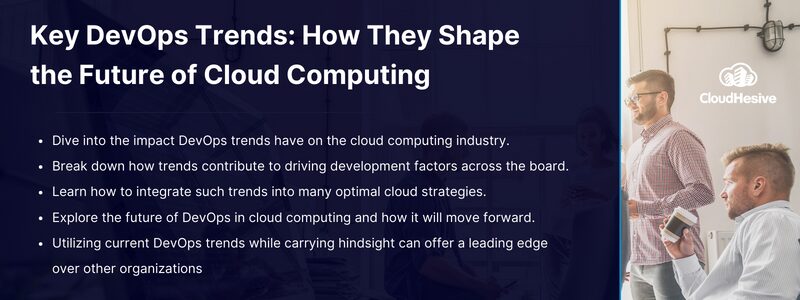Staying on top of the rapidly evolving world of DevOps is challenging. Using prevalent DevOps trends can significantly impact project success in the evolution of cloud computing.

Considering the world of DevOps requires a collaborative approach, knowing the most efficient and effective trends benefits everyone involved. To effectively improve products to market and reduce downtime while remaining competitive, organizations can benefit by staying on top of leading trends.
This includes a bird’s eye view of DevOps, considering rapid delivery, scalability, collaboration, security, and more. Automation and enhancements are other key focal points in DevOps, and this only becomes harder to accomplish by using outdated practices. By spending more time with changing trends in DevOps year over year, companies can retain a competitive advantage and continuously scale.
While there are many different routes to stay on the leading edge of DevOps, understanding Amazon Web Services (AWS) is a crucial starting point. Learning about the most relevant trends in DevOps can help make organizations more competitive and efficient in their niche while helping create actionable, future-proof cloud strategies.
Current and emerging trends in DevOps
Best practices in DevOps will always remain relevant, but there’s an ongoing need for innovation, which leads to a steady stream of trends. This keeps organizations focused on development processes on their toes, but it makes an already competitive market even more challenging to navigate. However, staying at the forefront of leading trends in DevOps can give companies a better chance at becoming a leader in the cloud computing revolution.
-Serverless computing
Through serverless computing, a cloud vendor can provide back-end services on demand. Another notable benefit includes the payment model, as it’s based on actual usage in terms of storage and resources. Although physical servers are still a part of the process, management and a lot of the manual approach to traditional servers are taken off the workload.
-DevSecOps
Simply put, DevSecOps considers integrating security practices throughout the entire development process. In a world where cybersecurity is a prominent concern for businesses and the general public, there’s an increasingly growing need for DevSecOps in software development.
As the landscape of DevOps continues to grow and become more diverse, there’s a demand for more comprehensive or “all-in-one” solutions regarding cloud computing platforms. This is where services like AWS come in handy.
-Amazon Web Services
A cloud computing platform that supports software development, database storage, cloud computing, and more, AWS is becoming a need in the DevOps space. The benefits and services it provides are hard to ignore, especially for organizations looking to remain a leading force in development.
Aside from that, AWS helps to streamline development processes and collaboration while shortening the timeline for product to market. The well-cemented necessity for AWS at this point and time is only making way for more tools and services through the cloud computing platform.
These are only a few examples of trends that are emerging and ongoing in DevOps. Some trends are more well-known than others, but professionals can’t argue that the space of cloud computing is changing as we speak.
The impact of DevOps trends on cloud computing
On the surface, these trends offer immediate benefits for efficiency, scalability, and security in every way. Not only is this something that’s needed innovation for quite some time, but it gives developers the flexibility they need to adapt on a whim.
Organizations like the cost-efficiency of cloud computing, while developers see the benefit in essentially every way. Notable benefits include:
- File sharing
- Streamlining workflows
- Ensuring security for proprietary documentation and the end user
The potential upside to DevOps in cloud computing is a rabbit hole many organizations are diving into, as it provides a leading edge from several angles.
Adapting to DevOps trends for optimal cloud strategies
Considering the undeniable competitive approach toward cloud computing, many companies are looking for ways to remain competitive. Knowing about DevOps trends is one thing, but putting them into action for business strategy is another.
In many ways, utilizing serverless computing speaks for itself. It’s less expensive, much more responsive, ensures less downtime, and makes information sharing much more accessible. The technology is excellent for application development, IT services, data processing, etc.
As mentioned earlier, there’s an increasing demand for cybersecurity. DevSecOps can be used for automated security testing and vulnerability management, to name a few. Regarding AWS, this includes a long list of services businesses can use for software development, IT, and business growth needs.
With cloud computing evolving as we speak, it’s vital to stay on top of emerging education. This is the only way organizations can continue to grow in an increasingly competitive market.
The future of cloud computing with evolving DevOps
Although the areas of DevOps and cloud computing have hit numerous strides in recent years, the future holds quite a bit on both ends. There’s a growing adoption of cloud technology on a global scale, which will inevitably increase demands for DevOps professionals.
This isn’t a negative by any means, but it does highlight the importance of proactive adoption. With many companies scrambling to catch up to current DevOps trends, it’s better to be one step ahead and be ready for what’s coming next. Due to the topic’s competitive and rapidly changing nature, it doesn’t hurt to seek a little help from those in the know along the way.
Working with experts in DevOps
The importance of DevOps is no secret to the software development industry, but many emerging trends are still new to those exploring the benefits of cloud computing. With so many new services, tools, and benefits for DevOps on the horizon, working alongside the experts can help mitigate the learning curve.
At CloudHesive, we’re more than aware of the ongoing trends in the DevOps space. We offer several tools and services that integrate alongside AWS for an enhanced development experience. Don’t hesitate to review our case studies, highlighting our expertise, and see how we can shift your organization into modern DevOps and cloud computing.
Ready to take the next steps? Contact us and start a new journey today.



